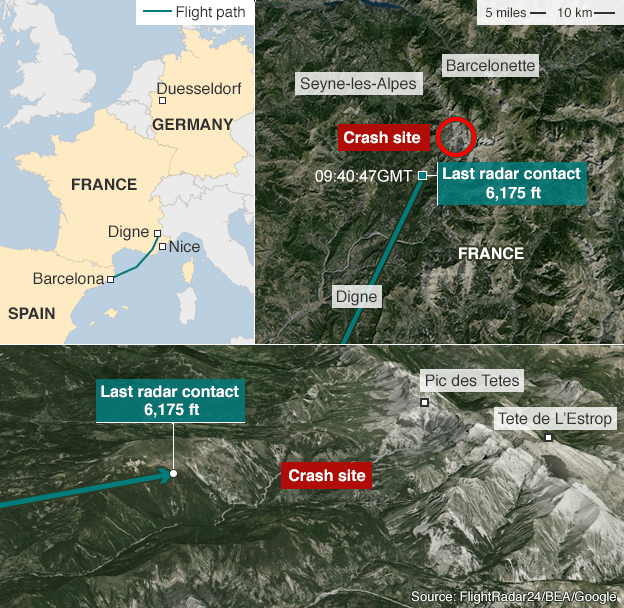Germanwings plane crash: Pilot 'locked out of cockpit'
- Published
Co-pilot Andreas Lubitz, seen here on his Facebook profile, controlled the plane's descent, Marseille prosecutor Brice Robin said
One of the two pilots of the Germanwings plane that crashed in the French Alps was locked out of the cockpit, according to reports.
Early findings from the cockpit voice recorder suggest the pilot made desperate efforts to get back in, sources close to the investigation say.
A German state prosecutor confirmed the reports, Reuters reported, but he did not know which pilot was locked out.
The Airbus 320 from Barcelona to Duesseldorf crashed on Tuesday.
Relatives of the 150 passengers and crew who died are due to visit the area on Thursday.
Lufthansa, which owns Germanwings, arranged two special flights for families and friends on Thursday - one from Barcelona and one from Duesseldorf - to Marseille, and both groups will travel on by road. Separately, some relatives who did not want to fly are travelling by bus from Barcelona.
French Interior Ministry video shows wheels from the plane as well as the recovery operation
Germanwings chief Thomas Winkelmann said 72 passengers on flight 4U 9525 were German citizens, including 16 pupils returning from an exchange trip. Spain's government said 51 of the dead were Spanish.
Other victims were from Australia, Argentina, Britain, Iran, Venezuela, the US, the Netherlands, Colombia, Mexico, Japan, Denmark and Israel.
On Wednesday, French officials said usable data had been extracted from the cockpit voice recorder but that it was too early to draw any conclusions.
Remi Jouty, director of the French aviation investigative agency, said he hoped investigators would have the "first rough ideas in a matter of days" but the full analysis could take weeks or even months.
However, the New York Times quoted, external an unnamed investigator as saying that one of the pilots - it is not clear if it is the captain or the first officer - left the cockpit and had been unable to get back in.
"The guy outside is knocking lightly on the door, and there is no answer," the investigator said, describing audio from the recorder.
"And then he hits the door stronger, and no answer. There is never an answer. You can hear he is trying to smash the door down."
A source close to the investigation gave a similar account to the AFP news agency.
An alarm indicating proximity to the ground can be heard before the moment of impact, the source adds.
Lufthansa has not named the pilots but it said the co-pilot joined Germanwings in September 2013, directly after training, and had flown 630 hours.

Analysis by Richard Westcott, BBC transport correspondent
This latest revelation, if true, begins to paint a dramatic picture of the last moments in the cockpit. But there are still plenty of questions to answer.
Why did the plane dive? Locked doors don't make planes crash. Why couldn't the pilot open the door? There is an emergency procedure that should allow them to get back in. Who was flying? We now know the co-pilot was relatively inexperienced. Was he trying to cope with an emergency on his own?
If there really was banging on the door, it might also suggest there was at least air in the cabin, because someone was clearly able to breathe. There had been talk of a depressurisation knocking everyone out.
It is surprising that such sensitive information has leaked out - again, it's still not officially confirmed. The rules governing who listens to black boxes are very tight. Only a handful of people are normally allowed into the room when they play the recording back.

It said the captain had more than 6,000 hours of flying experience and had been with Germanwings since May 2014, having flown previously for Lufthansa and Condor.
Lufthansa has not commented on the reports surrounding the cockpit door, but said its cockpit protocols are in line with rules established by the German aviation safety authority.
These stipulate that when there are two crew, one can leave the cockpit but only for the absolute minimum time.
BBC business reporter Theo Leggett says some airlines have a "rule of two" where if a pilot leaves the cockpit for any length of time another crew member must replace them. However, this is not the case with Lufthansa or some other major airlines.
Emilien Cesarano: "Some colleagues on the next security post heard an engine sound, but nothing like an explosion"
David Kaminski-Morrow, air transport editor of Flightglobal, said that normally a locked cockpit door could be opened with a code.
"But inside there is a simple switch on the control panel the pilot would turn to lock the door," he said.
He cited the crash of a Mozambican Airlines flight in Namibia in 2013 in which the pilot is believed to have locked himself in the cockpit and put the plane into a nose dive.
Mr Jouty said the second "black box" - the flight data recorder - had not been found and he could not confirm an earlier statement by President Francois Hollande that its casing had been recovered.
